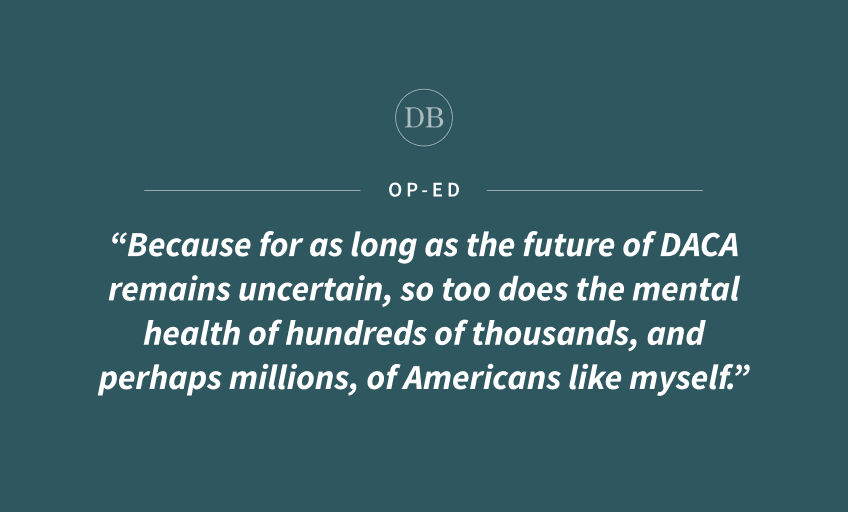Op-ed: DACA’s uncertain future negatively impacts mental health of recipients, many more

By Fahima Zaman
March 6, 2021 5:01 p.m.
On June 18, I had spent another sleepless night awaiting a decision that would impact my life trajectory. Would I continue to be able to live in the country that I had been in since I was 3 years old? Could I continue to teach in the community that I have worked in for the past five years? Or would the decision tell me that I just was not American enough?
Fortunately, this was not the end of my time in the U.S., but it was also not the first or last time I would spend a sleepless night waiting for someone else to determine my future.
The Deferred Action for Childhood Arrivals program covers undocumented immigrants who were brought to the U.S. as young children and shields them from deportation and provides work permits. Prior to DACA, I was constantly scared of deportation. Both my physical and mental health suffered from this heightened fear, but I did not have access to health care to address these issues. After DACA, however, I was able to dream bigger, act fearlessly and focus on improving both my physical and mental health. I graduated with a bachelor’s degree in physiology from UCLA, worked as a teacher and am now back at UCLA pursuing my master’s degree in public health.
I am just one of 712,610 people who currently have DACA. However, it is estimated that there may be up to 3.6 million eligible for the program, according to the National Immigration Forum. Forty percent of those eligible for DACA reported improved mental health after its creation.
Unfortunately, the positive mental health effects of DACA have been short-lived as its future remains unclear due to continuing court challenges. In 2014, an attempt to expand DACA and include protections for parents, called the Deferred Action for Parents of Americans and Lawful Permanent Residents program, was challenged by Texas and 25 other states, resulting in a federal court blocking these expansions in 2015. In 2017, former President Donald Trump’s administration attempted to rescind DACA and those actions have been debated in courts since.
The uncertainty shrouding DACA has undone the improvements made in mental health outcomes within the first few years of DACA. In 2017, the mental health outcomes for DACA-eligible immigrants were roughly the same as pre-DACA outcomes. This shift was tangible in my high school classroom as heightened anxiety led to increased outbursts and plenty of tears.
Our health care system is not equipped to handle further mental health fallout from DACA’s potential termination. A survey conducted for the Center for American Progress found that 57% of DACA recipients said they had gotten a job with health insurance after their DACA application was approved. Therefore, loss of DACA status would simultaneously result in the loss of health care coverage, as most would lose their work authorization, making it highly unlikely that these individuals could afford to seek care. These individuals may also isolate themselves because of fear of deportation, making it difficult to organize mental health resources for those who need them the most. Ultimately, these young individuals would be suffering in silence.
Although DACA survived the 2020 Supreme Court decision, the Supreme Court has never ruled on the legality of DACA, only on the procedures used to rescind it. For those like myself, we still fear the future. DACA is back in the same district court that originally blocked the DACA expansion and could potentially land in the Supreme Court, where there is now a 6-3 conservative majority. Although President Joe Biden has signed an executive order fortifying the policy, courts will continue to be used to block executive actions. The most recent action by a federal judge to block Biden’s administration from implementing a 100-day pause on deportations is proof of this.
Executive orders will never be enough to protect us. The Biden administration’s U.S. Citizenship Act of 2021 includes a pathway to citizenship for these young adults. Opinion polls show 74% of Americans favor legal status for DACA recipients like me. Congress should immediately pass the most popular portion of this bill and finally offer these young people permanent peace of mind. Because for as long as the future of DACA remains uncertain, so too does the mental health of hundreds of thousands, and perhaps millions, of Americans like myself.
Zaman is a first-year graduate student in community health sciences and an integrative biology and physiology alumna.


